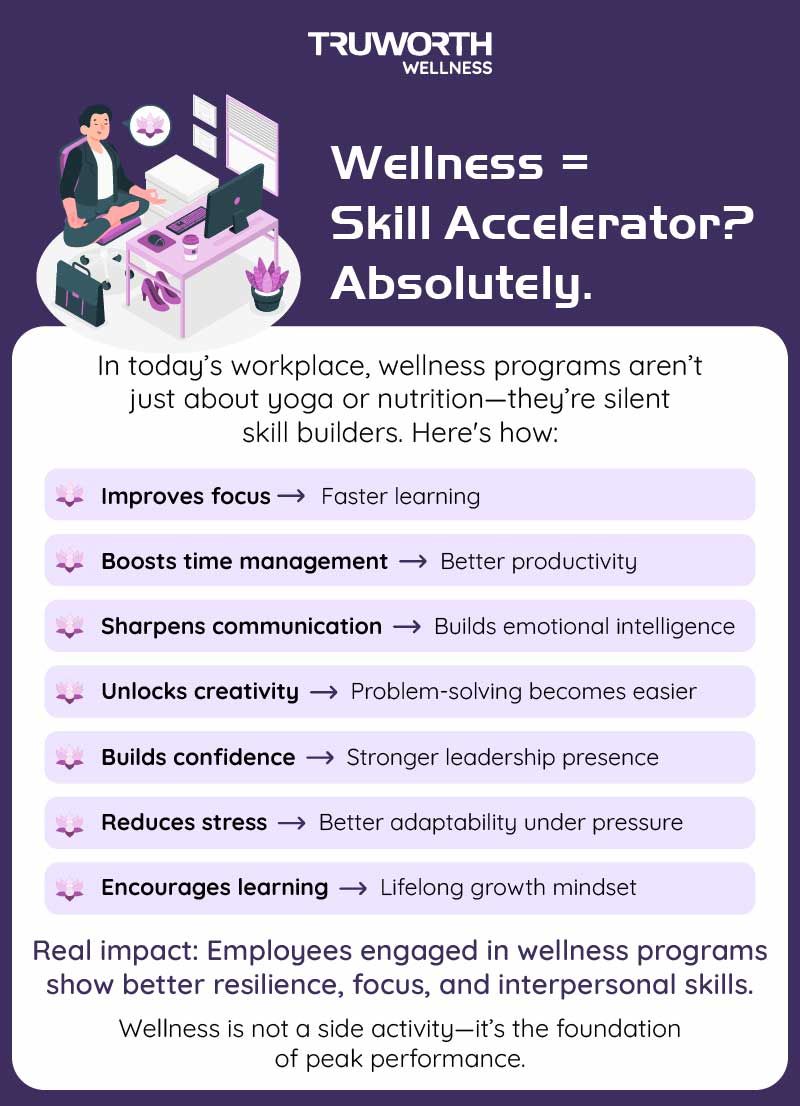How Can Wellness Programs Help Polish Skills?

When you think of wellness programs at work, what comes to mind? Step challenges? Mental health webinars? Yoga at your desk? These are great, but there’s more going on beneath the surface.
Modern wellness programs aren’t just about feeling better—they’re about functioning better. And in today’s fast-paced professional world, how well you function has a direct link to how fast and how well you can grow your skills.
Whether you’re trying to sharpen your communication, master time management, or become a more adaptable leader, wellness programs play a surprisingly powerful role in helping you do that.
Let’s dive into how these programs don’t just heal, but also hone.

1. Enhances Focus and Mental Clarity
A distracted or foggy mind is one of the biggest barriers to learning and growth. It makes you forget what you read, skip details, and struggle with new concepts.
How does wellness help?
- Mindfulness sessions train the brain to stay present, one of the most underrated ways to boost memory and understanding.
- Hydration and nutrition advice from wellness experts improves brain function.
- Sleep hygiene campaigns help reset the body’s natural rhythms, reducing mental exhaustion.
Skill impact: Sharper concentration, better comprehension, and improved performance in learning-intensive tasks.
Example: A content marketer who starts practicing 10-minute daily meditation notices she writes faster and edits better because her focus lasts longer.
2. Builds Better Time Management
Time is a limited resource. Most people aren’t short on talent—they’re short on energy and discipline. Wellness programs build time consciousness and teach you how to protect your energy.
How does wellness help?
- Daily habit tracking improves consistency.
- Well-being apps with reminders and scheduling tools create structure.
- Coaching sessions help employees recognize and address time-energy mismatches.
Skill impact: Better planning, improved meeting efficiency, reduced procrastination.
Pro tip: Just 15 minutes of intentional movement between long work blocks helps reset focus and saves more time than it takes.

3. Sharpens Communication and Empathy
Communication isn’t only about talking—it’s about listening, processing emotions, and managing reactions. All these abilities get sharper when your emotional health is cared for.
How does wellness help?
- Mental health programs provide people with a language to express themselves.
- Group wellness challenges encourage interaction across teams.
- Stress management training helps reduce overreactions during conflicts.
Skill impact: Polished workplace communication, improved collaboration, stronger emotional intelligence.
Real story: After joining a resilience training workshop, an operations manager shared that he no longer shuts down during heated discussions—he now responds with calm facts and wins trust faster.
4. Encourages Creative Thinking
A creative mind needs room to breathe. But when the brain is overloaded, anxious, or tired, creativity is the first casualty.
How does wellness help?
- Art-based wellness workshops (like doodling or expressive journaling) foster right-brain activation.
- Nature breaks and movement sessions stimulate brain chemicals, such as dopamine, which are linked to idea generation.
- Mental rest strategies, such as digital detox, improve imagination.
Skill impact: Innovative problem-solving, design thinking, and quicker idea generation.
Try this: Start your day with 5 minutes of intentional silence. Your brain will surprise you with fresh ideas.
5. Boosts Confidence and Self-Efficacy
When someone accomplishes a health goal—whether that’s weight loss, overcoming burnout, or simply drinking more water—they prove to themselves that change is possible.
How does wellness help?
- Micro-goal planning helps employees track small wins.
- Motivational feedback loops in apps make progress visible.
- Personal coaching unlocks hidden confidence.
- Skill impact: Improved public speaking, more risk-taking in decisions, enhanced leadership presence.
Did you know? Employees with higher self-efficacy are 80% more likely to take ownership of projects and suggest improvements.
6. Improves Adaptability and Stress Management
In today’s hybrid or AI-driven workspaces, adaptability is key. The ability to stay calm, learn quickly, and shift gears comes from good mental hygiene.
How does wellness help?
- Resilience programs teach people how to bounce back after setbacks.
- Yoga and breathwork strengthen the nervous system.
- Sleep and rest strategies reduce reactionary thinking.
Skill impact: Quick recovery from failures, better attitude toward change, stable performance during chaos.
Bonus tip: Adding just 10 minutes of breathwork after a long day can reduce cortisol levels and make room for faster recovery from stress.
7. Supports Lifelong Learning Habits
A healthy employee is more open to new information. This is not just biology—it’s a mindset.
How does wellness help?
- Wellness journaling promotes self-reflection and curiosity.
- Flexible wellness learning modules encourage continuous growth.
- Personalized recommendations on wellness platforms create intrinsic motivation.
Skill impact: Active participation in learning programs, quicker upskilling, internal drive to improve.
Why does it matter? When wellness is seen as a journey, not a task, it mirrors the mindset needed for lifelong learning.

8. Promotes Better Leadership Capabilities
Leadership is not just about directing—it’s about inspiring, listening, adapting, and staying grounded. Wellness programs train leaders to embody those values.
How does wellness help?
- Leadership-focused coaching promotes emotional regulation.
- Well-being scorecards help leaders stay accountable for their energy.
- Culture-based initiatives encourage value-based leadership.
Skill impact: Authentic leadership, crisis management, and a servant leadership mindset.
Great leaders prioritize their health because they know their teams mirror their emotional energy.
Small Start, Big Impact
For starters, any company can include the following:
- Gamified wellness tasks that reinforce discipline, goal-setting, and follow-through.
- AI-based mental health tools that improve decision-making and emotional intelligence.
- Leadership wellness programs that combine strategic thinking with holistic well-being.
These programs aren’t just perks—they’re pipelines to progress.
Conclusion: Wellness Is the New Soft Skill Accelerator
The workplace has changed. It’s no longer about doing more hours—it’s about bringing your best self to those hours. And the best way to do that?
By investing in your wellness.
So the next time your company rolls out a wellness initiative, don’t just see it as a fitness challenge or a mental health day. See it as a skill lab—one where every habit, every step, and every mindful moment is preparing you to grow stronger in your career.
Ready to level up your skill set through wellness?
Let Truworth Wellness help you create a culture where employees don’t just survive the workday—they thrive, grow, and lead with impact.

